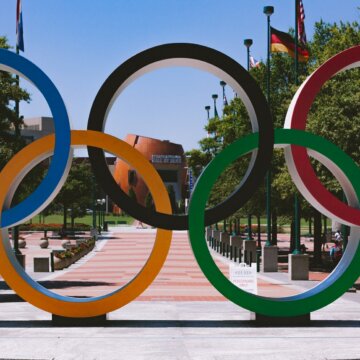- About
- Topics
- Picks
- Audio
- Story
- In-Depth
- Opinion
- News
- Donate
- Signup for our newsletterOur Editors' Best Picks.Send
Read, Debate: Engage.
| topic: | Good Governance |
|---|---|
| located: | China, France, Lithuania, Germany, Spain |
| editor: | Abby Klinkenberg |
As the world counts down the days until the Opening Ceremony of the 2022 Beijing Olympics on 4 February, a haze of concern over human rights abuses in China has settled over the event. Facing scrutiny for a range of human rights violations, from its treatment of its Uyghur population to its crackdown on democratic freedoms in Hong Kong, China has been emphasising the political neutrality of the Olympic Games in an attempt to dodge uncomfortable scrutiny from the international community. European leadership is divided on the question of whether to pursue a diplomatic boycott of the Games in an effort to pressure China into better enactment of international human rights standards.
In 2020, over 160 human rights groups urged the International Olympic Committee to move the 2022 games out of China. Recently, Amnesty International has urged the international community not to allow Beijing to get away with a “sportswashing exercise” that sweeps its human rights violations under the rug. The organisation cites China’s suppression of political activism; silencing of sexual assault survivors (as in the case of tennis star Peng Shuai); continued reliance on the death pentalty; and the “mass internment, torture and persecution” of its Muslim Uyghur population as cause for serious concern and diplomatic repercussions.
Try as it might, the European Union could not arrive at a common position on the matter. As a result, the EU27 have gone their separate ways, pursuing a range of policies from outright diplomatic boycotts to full-on flying-in of government officials.
While nine EU member-states are planning to conduct business as usual and send diplomatic representation to Beijing, nine have yet to make their position known (Germany and Spain being the most consequential). Nine have announced that none of their officials will be in attendance. Now, of those nine countries, four have decided to cite the “pandemic” as the primary reason behind not sending diplomatic envoys. This particularly courageous tack has been taken by Austria, Slovenia, Sweden, and the Netherlands. Portugal has remained ambiguous, citing “various reasons.”
Potentially exposing themselves to serious consequences, the remaining four EU countries - Belgium, Denmark, Estonia, and Lithuania - have been explicit in citing China’s human rights violations as the reason behind their diplomatic boycotts. This camp is also backed by the old guard of global powers: the US and the UK, along with their anglophone companions Canada and Australia. New Zealand has been more pragmatic, instead choosing to cite the “pandemic” as its reason for not sending representation to the Games.
The circumstances of Lithuania’s boycott, in particular, reveal the EU’s lack of solidarity: a spicy dispute between China and Lithuania erupted last summer over the latter’s increasingly cosy relationship with Taiwan. Lithuania’s implicit refusal to support Beijing’s One China policy put further strain on an already tense relationship. The standoff occurred shortly after the Baltic state withdrew from the 17+1 bloc, now the 16+1 bloc, which aims to bolster relations between China and 16 eastern European states.
China, exasperated by Lithuania’s refusal to play by its rules, has since embarked upon a trade war that has exposed the EU’s powerlessness. The lack of EU27 coordination on the comparatively soft issue of diplomatic representation at the 2022 Olympics suggests that a bloc-wide China policy may be far out of reach.
While Germany’s new Chancellor Olaf Scholz dithers, France has also missed an opportunity to strengthen its EU leadership in a post-Merkel landscape by sending mixed signals: Paris will send diplomatic representation to the Games despite the French National Assembly’s recently passed resolution that recognises China’s treatment of the Uyghurs in Xinjiang as “genocide.” The only other European countries to have done this (Belgium, the Netherlands, and the United Kingdom) will not send representation to the Games. It’s clear that Macron fears retaliation - and great continental leadership can never emerge from a place of fear.
That the EU is simply too disjointed to arrive at a common approach to China, baulking at shoring up support for Lithuania in its ongoing trade war and failing to arrive at a common Olympic position, suggests that its lofty human rights ambitions are mere rhetoric. The EU’s supposedly common core values - human dignity, freedom, democracy, equality, rule of law, and human rights - are clearly not very common. As the Opening Ceremony draws nearer, the nine so-far-silent EU countries will be put under pressure to clarify their positions and ultimately decide whether to do the bare minimum and stand up for human rights.
Photo by Bryan Turner

